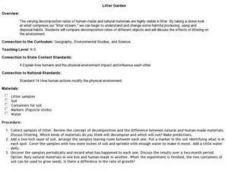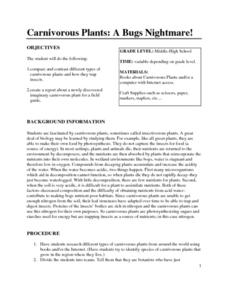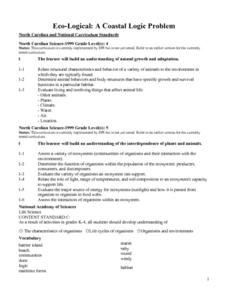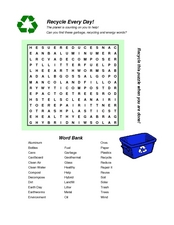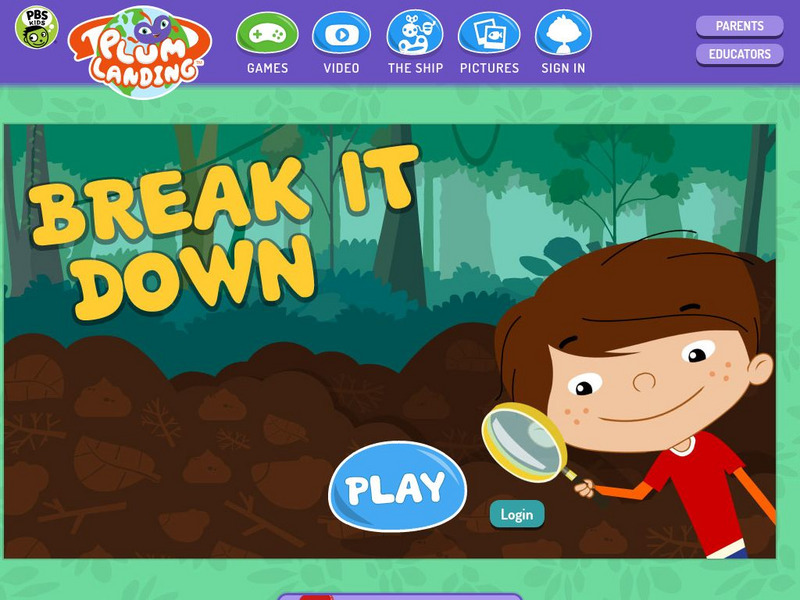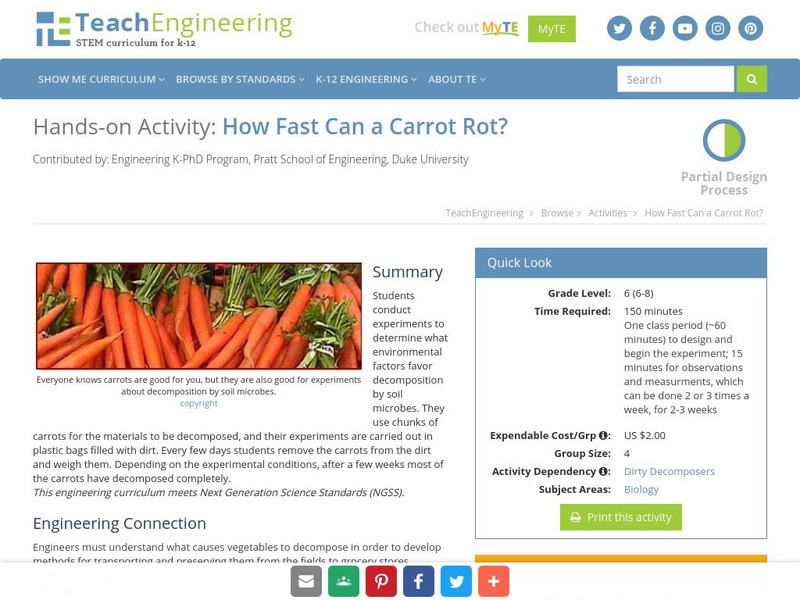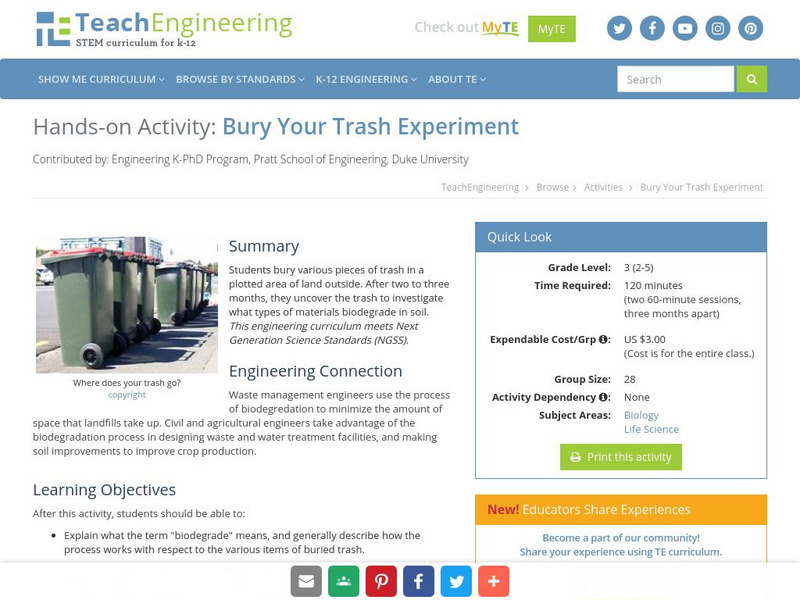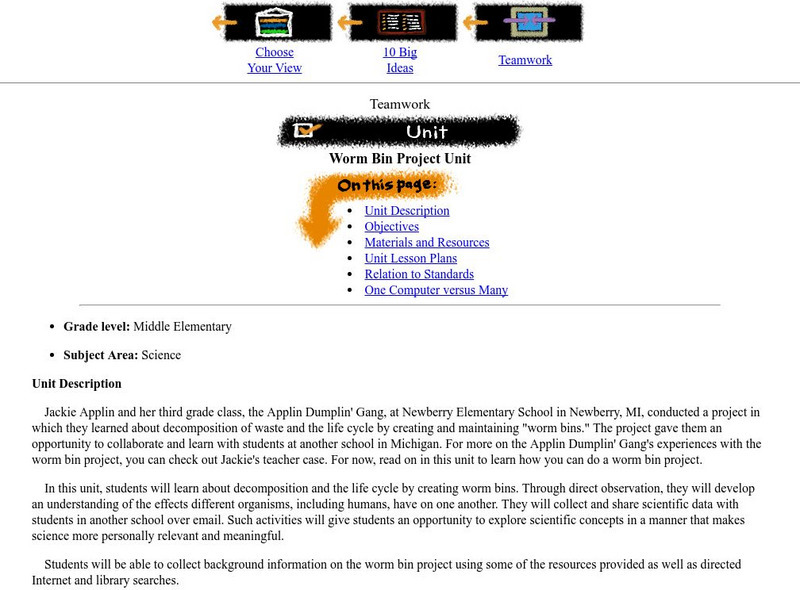Curated OER
The Web Of Life - Overlapping Food Chains
Young scholars perform an activity in which they discover what happens when food chains overlap in an ecosystem and discover the three components of a food web.
Curated OER
Can Fun Gus Help Plants/Trees Grow?
Students participate in an experiment in which they test the growth of different types of plants. They discover how growth rates vary using inoculum. They draw pictures and are read books about plants to end the activity.
Curated OER
Litter Garden
Students discuss what man-made and natural materials are visible in litter. Using a sample of litter, they review the concept of decomposition between the two types of materials. They examine the two samples once and a while and record...
Curated OER
Our Schoolsyard is Full of Biology
Students study the habitats found in their schoolyard. They apply firsthand, what they have learned in the classroom to something familiar to them. Students look at biotic, abiotic habitats. Small groups will present their findings to...
Curated OER
Think Green
Students experience and practice compositing and recycling through hands-on-activities. They distinguish between which items from their trash can be recycled, composted and reused. The process for making recycled paper is also covered in...
Curated OER
Home on the Biome
Fifth graders study six major biomes, graph temperature and rainfall, and present their findings to the class.
Curated OER
The Principles Of Composting
Students put items in a plastic bag and watch the effects of composting. While completing the experiment, students answer questions and ask permission to start their own compost pile at home.
Curated OER
Compost Columns
In this unit of lessons, young scholars examine the role of compost columns and recycling. They create a KWL chart about garbage in Chicago. They also examine life cycles and packaging of everyday products.
Curated OER
Carnivorous Plants: A Bugs Nightmare!
Students research carnivorous plants and how they trap insects. They role play as botanists to write a research field guide about a newly discovered imaginary carnivorous plant.
Curated OER
Eco-Logical: A Coastal Logic Problem
Fourth graders study the characteristics of five coastal communities. They use logic cards and matching activities to identify the proper community for plant and animal species.
Curated OER
De"compost"ition Activity
High schoolers investigate the decomposition process and the parameters which influence the rate at which it occurs. They design a "controlled" experiment by comparing decomposition rates between two compost piles. Analysis questions...
Curated OER
Recycle Every Day
In this recycling worksheet, 3rd graders complete a word search. Students locate 36 words in the puzzle, all associated with reuse of various items.
Discovery Education
Discovery Education: The Dirt on Soil
This interactive website explores the various soil layers and introduces you to the lifeforms that live in those soil layers.
TeachEngineering
Teach Engineering: Dirty Decomposers
Students design and conduct experiments to determine what environmental factors favor decomposition by soil microbes. They use chunks of carrots for the materials to be decomposed, and their experiments are carried out in plastic bags...
PBS
Pbs Kids: Plum Landing: Break It Down
This PBS Kids activity is an extension of a Plum Landing episode featuring decomposers in the jungle. Students will combine different decomposers with fallen jungle materials to help form rich soil.
TeachEngineering
Teach Engineering: How Fast Can a Carrot Rot?
Students conduct experiments to determine what environmental factors favor decomposition by soil microbes. They use chunks of carrots for the materials to be decomposed, and their experiments are carried out in plastic bags filled with...
Mocomi & Anibrain Digital Technologies
Mocomi: What Is Compost?
Compost is decomposed organic matter that we can add to the soil to introduce some essential nutrients. Discover what compost is made of and what it is used for.
TeachEngineering
Teach Engineering: Bury Your Trash!
This activity will allow students to bury various pieces of trash in a plotted area of land outside. After approximately two to three months, the trash will be uncovered to allow the students to investigate what types of materials...
Other
Pa State Dept.: Composting [Pdf]
This subject page on compost is informative, regarding home composting, grasscycling, and vermicomposting, along with compostable material charts, basic instructions, and fine tuning of the composting procedure. Site lists uses/benefits...
BiologyWise
Biology Wise: Digestive System of an Earthworm
Provides information about the anatomy of the earthworm's digestive system and why the earthworm plays such an important role in soil health.
PBS
Nh Pbs: Nature Works: Ecosystems
How would you define an ecosystem? Check out this educational resource to learn more about the living and nonliving parts of different ecosystems.
Michigan State University
Michigan State University: Lets Net: Worm Bin Project Unit
Learners learn about the worm life cycle and decomposition of life by creating small-scale worm ecosystems. Research groups share scientific data with groups at other schools using web-based communication tools.
Other popular searches
- 4 Soil Decomposers
- Types of Soil Decomposers
- Four Soil Decomposers
- Ten Soil Decomposers
- "4 Soil Decomposers
- Exambles of Soil Decomposers
- \"4 Soil Decomposers




